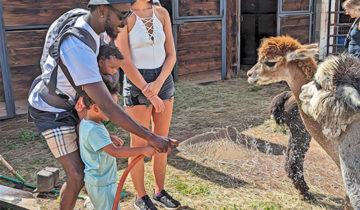Colorado alpaca adventures package 2023: Alpacas hum; they make a sound like “mmm,” according to Alpaca Ventures. However, they also shriek when danger is present, and make a sound similar to a “wark” noise when excited. Fighting males scream, making a warbling bird-like cry. Alpacas in a herd all use the same area as a bathroom instead of defecating in random areas like many animals do. This behavior helps control parasites, according to the FAO. Males often have cleaner dung piles than females, according to Alpaca Ventures. Females tend to stand in a line and all go at once. Find more details at where to see alpacas in Colorado.
Still, seeing alpacas on a ranch in what many consider to be a big city out West can be a bit mind-boggling. What is life like on the ranch? What does an alpaca eat? Do they run and play with each other? Are alpacas high maintenance and easy to care for? Get all your questions just like this (and more!) answered. Your expert guide will fill you in on what it’s like to live and work on an alpaca farm. It offers views of the gorgeous surrounding areas : Do you want to see Colorado mountain views without needing to hike? Whether you’re traveling with a large group, have small children in tow, or just don’t like hiking, this experience will allow you to take in scenic mountain views in a unique way. When you go behind the scenes on the ranch, you learn about much more than just the animals. You have the opportunity to talk about the economy, trade, production, local handmade goods, and so much more.
Alpaca fur is a very prized fiber for artisans and crafters. Alpaca fur is very soft and does not retain water. It is also very durable. According to National Geographic, alpaca fur is the second strongest animal fiber, after mohair. Alpacas come in 22 colors, from a true, blue-black through browns and tans to white, according to Alpaca Ventures. Some Andean people eat alpaca meat. In Peru, it is often served in upscale restaurants. Alpacas don’t have teeth in the top-front of their mouths. This gives them the appearance of having an underbite.
Are alpacas dangerous? No. Alpacas are pleasant to be around and generally easy to handle. Alpacas do not head-butt. They do not have horns or hooves like other livestock. They move gracefully and adroitly about the field and are therefore unlikely to run into or over anyone intentionally. Males develop sharp fighting teeth at about three years of age which can cause injury to both humans as well as other alpacas. Alpacas will reflexively kick with a hind leg, particularly if surprised from behind. While the impact of an alpaca kick is not on par with a horse, it can create a bruise. Also, there is potential for toenails to cut skin.
Are alpacas an “exotic species,” or are they considered simply “livestock?” Alpacas have been raised as domestic livestock for thousands of years. Since the end-product of alpacas is their fleece, like sheep, they are classified as livestock by both the United States and Canadian federal governments. Do alpacas spit? All members of the camel family use spitting as a means of negative communication. They do get possessive around food, and may express annoyance by spitting at other alpacas that they perceive are encroaching on “their” food. Also, they often spit at one another during squabbles within the herd (usually involving two or more males). From time to time alpacas do spit at people on purpose, but it is more common that humans get caught in the crossfire between alpacas, so it’s best to study their behavior and learn to avoid the most vulnerable situations.
Get ready for an Alpaca Adventure ! A Wildly Immersive and Hilarious Alpaca Adventure Perfect For All Ages : Embark upon an unforgettable magical experience with affectionate Alpacas, and explore the scenic mountain views of Red Rocks Park. We offer truly unique experiences that gets you up-close with these majestic friends. You’ll be entertained and educated on their habits, diets, and life on the ranch as you discover what makes these creatures so special. Discover additional details on https://meetalpacas.com/.
Are alpacas easy to train? Alpacas are very smart animals and are fairly easy to train. It is best to start training them when they are young so that they will accept a halter and learn to follow on a lead. Many owners also enjoy training them to walk through obstacles. Some even compete with their alpacas at shows where they walk over, through, and around objects and also jump over small hurdles. Also, it is helpful to train alpacas to ride in a trailer or van if they ever need to be transported to a show or another farm. Alpacas are easy to transport, as they normally cush (lay down with their legs folded under them) when traveling. Be aware that alpacas should not be tied up when traveling.



